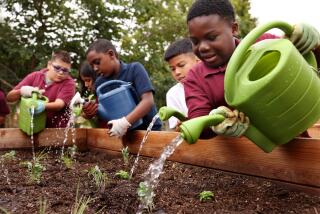Students Learn Inputs, Outputs of Computer Care
- Share via
SANTA PAULA — The classroom computer won’t turn on? The mouse doesn’t work? The screen flashes “keyboard error?”
No problem. Just call the McKevett Elementary School technology mentors. They’ll come running, maintenance tip sheet and computer cleaning kit in hand. And they’ll take out their dust rags and soapy solution and get to work.
Since January, technology liaison Ken Kleveland has been teaching students in the Santa Paula Elementary School District how to clean and care for classroom computers--some of which are more than 10 years old.
“Computers don’t get the attention they need,” he said. “When you turn the keyboards over, you won’t believe the junk that flies out. We’ve found staples and erasers and all kinds of things.”
Ventura County teachers are increasingly training some of their students as technology trouble-shooters, so pupils can help maintain old computers and install new ones. Principals say the students relieve teachers and limited technology staffs from the task of basic computer repair during an era when schools are buying computers almost as quickly as books.
But more importantly, the technology classes empower students who may not be involved in sports, drama or leadership, educators say.
“It promotes a positive self-image because they are able to do something that nobody else can do,” Kleveland said. “Sometimes they know more than their teachers.”
About 75 students are technology mentors in Santa Paula, among the largest programs in the county. Twenty-seven participate in a similar program at Balboa Middle School in Ventura, and eight students are enrolled in an elective class at Colina Middle School in Thousand Oaks. Other schools throughout the county have informal technology mentor programs.
Twice a month, Kleveland visits district schools to meet with the mentors. During a recent lunchtime training session at McKevett, the students--ages 9 through 11--disassembled a computer. They passed around floppy drives, memory cards and motherboards--and learned how each part works.
Cecilia Valdez, 9, said she became a technology mentor because she likes tinkering with technology. “I get to open computers, and take out the ball in the mouse,” she said.
After class, 10-year-old Jerry Diaz and 9-year-old Viri Rojas carried their tool bucket to a classroom, where they unplugged two computers, dusted the keyboards and wiped the monitors. While Jerry focused on cleaning, Viri dutifully recorded their task in the logbook. Problem? “It was dirty.” Solution? “Just cleaning.”
The logbook details instructions on how to properly connect the mouse and the keyboard, how to clean and maintain the computers, and safety tips: Do not drink cleaning solution. Do not lick fingers after using cleaning solution.
Viri said she likes helping kids and teachers with their computer problems. “I thought it would be a real fun thing to do, and it is a real fun thing to do,” she said. When she grows up, Viri said she wants to be a teacher and a computer cleaner.
During Jerry’s most difficult job, a teacher complained that the keyboard wouldn’t work. So Jerry unplugged all of the cords and put them back. He figured out that the keyboard wasn’t connected all the way. “The teacher was really happy with me,” Jerry said.
McKevett Principal Patti Fulbright said her school’s technology mentor program recruits students who likely aren’t involved in other extracurricular activities. “It’s a whole new avenue for kids to get interested in school,” she said. “It’s something for them to latch onto.”
Fulbright said she hopes her students will learn more technical knowledge when they get to middle school.
That’s happening at both Balboa and Colina middle schools. At Colina, teacher Chris van der Veen is showing his eighth-grade students how to reformat disks, design Web pages and do basic programming. And Mike Cragin’s seventh- and eighth-graders at Balboa know how to create Power Point presentations, update a Web page and maintain computers.
Both teachers only have one free period each day to devote to keeping the schools’ computers running. Colina has about 100 computers and plans to buy 200 more during the next five years. Balboa has about 180 computers.
Each day at Balboa, student mentors respond to about half a dozen computer problems.
“It’s a tremendous help to me and the school,” Cragin said. “We wouldn’t be able to have as many computers online without the kids helping out. They are performing thousands of dollars worth of services.”






